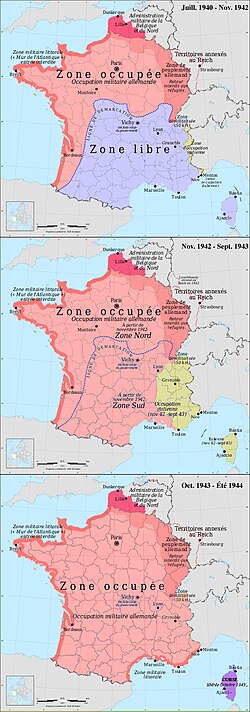Nazi occupation of Paris
| Military Administration in France | ||||||||||
|
Militärverwaltung in Frankreich Occupation de la France par l'Allemagne |
||||||||||
| Territory under German military administration | ||||||||||
|
||||||||||
|
German (pink) and Italian (green) occupation zones of France: the zone occupée, the zone libre, the zone interdite, the Military Administration in Belgium and Northern France, and annexed Alsace-Lorraine.
|
||||||||||
| Capital | Paris | |||||||||
| Political structure | Military administration | |||||||||
| Military Commander | ||||||||||
| • | 1940–1942 | Otto von Stülpnagel | ||||||||
| • | 1942–1944 | Carl-Heinrich von Stülpnagel | ||||||||
| • | 1944 | Karl Kitzinger | ||||||||
| Historical era | World War II | |||||||||
| • | Second Compiègne armistice | 22 June 1940 | ||||||||
| • | Case Anton | 11 November 1942 | ||||||||
| • | Liberation of Paris | 25 August 1944 | ||||||||
|
||||||||||
The Military Administration in France (German: Militärverwaltung in Frankreich; French: Occupation de la France par l'Allemagne) was an interim occupation authority established by Nazi Germany during World War II to administer the occupied zone in areas of northern and western France. This so-called zone occupée was renamed zone nord ("north zone") in November 1942, when the previously unoccupied zone in the south known as zone libre ("free zone") was also occupied and renamed zone sud ("south zone").
Its role in France was partly governed by the conditions set by the Second Armistice at Compiègne after the blitzkrieg success of the Wehrmacht leading to the Fall of France; at the time both French and Germans thought the occupation would be temporary and last only until Britain came to terms, which was believed to be imminent. For instance, France agreed that its soldiers would remain prisoners of war until the cessation of all hostilities.
Replacing the French Third Republic that had dissolved during France's defeat was the "French State" (État français), with its sovereignty and authority limited to the free zone. As Paris was located in the occupied zone, its government was seated in the spa town of Vichy in Auvergne, and therefore it was more commonly known as Vichy France.
...
Wikipedia



